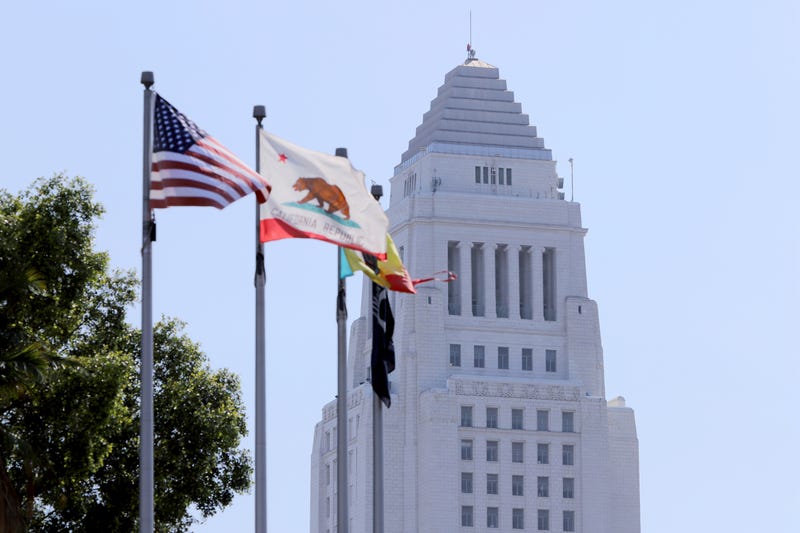
A Los Angeles faces a nearly $1 billion gap in the next fiscal year, six City Council members Friday proposed the formation of an advisory board to aid with meaningful budget reforms.
Want to get caught up on what's happening in SoCal every weekday afternoon? Click to follow The L.A. Local wherever you get podcasts.
Councilwoman Katy Yaroslavsky, the chair of the Budget and Finance Committee, introduced a motion Friday calling for such a group -- with support from Council President Marqueece Harris-Dawson and their colleagues Eunisses Hernandez, Hugo Soto-Martinez, Nithya Raman and Imelda Padilla.
Members of the group would be expected to have specific or relevant expertise in municipal finance and budgeting, economic development, real estate, liability management, government efficiency and or civil service systems. These would be voluntary positions and unpaid.
This group would also explore ways to bolster engagement by residents in the city's budget process. One such way might be community (citizen) assemblies, a group of people selected by lottery from the general population to discuss issues and provide guidance.
"Without meaningful reforms to how the city manages its budget, maximizes its assets and provides essential operations, Los Angeles will continue to face an annual crisis that creates spiraling instability," the motion reads.
"This moment requires the City Council to rethink how we reverse this trend -- avoiding one-year fixes to produce a balanced budget," the motion continued.
The motion will next be considered by the budget committee, as well as the Rules, Elections, and Intergovernmental Relations Committee at a future date.
On Wednesday, City Administrative Officer Matt Szabo said elected officials will need to address a nearly $1 billion gap in fiscal year 2025-26 that will require tough financial decisions that could lead to thousands of layoffs and cuts to services.
Szabo warned that the severity of revenue declines and rising costs created a scenario in which layoffs are "nearly inevitable."
"We are not looking at dozens or even hundreds of layoffs, but thousands," Szabo said. "While layoffs may be necessary, it cannot and will not be the only solution."
Among areas of concern highlighted by Szabo is a $61 million starting gap, which will be exacerbated by $315 million in lower-than-anticipated revenue from taxes, $100 million in liability payouts that are expected to increase, $275 million needed to restore the reserve fund, $80 million related to solid waste fees, and $100 million to cover pensions for members of the Los Angeles police and fire departments.
Szabo attributed the fiscal crisis in part to rising legal payouts in recent years. The CAO previously reported $112 million in payouts, and most recently projected that by the end of FY 2024-25 that expense will increase to $320 million.
In a letter, Mayor Karen Bass said she will "deliver fundamental change in the way the city operates." She directed the CAO to report to her with strategies to "reduce spending significantly while protecting essential services."
"This year, we must deliver fundamental change in the way the city operates and base our budget on how the city can best serve the people of Los Angeles and to best use their scarce budget dollars," Bass said in her statement.
According to Bass' office, downward economic trends mean the city is projected to take in hundreds of millions of dollars less than previously projected. In addition to these trends, costs associated with the recent wildfires are also expected to add to the burden.
The mayor is expected to release her proposed budget April 21. The City Council will then host multiple budget hearings in which they will hear from department heads about their priorities. Council members will be tasked with making revisions to the proposed budget -- which will ultimately need to be approved before the start of FY 2025-26, July 1.
Los Angeles City Controller Kenneth Mejia has emphasized that long- term reforms are needed to right-size the budget.
Mejia has advocated for a strategic approach to budgeting, such as a transition to a two-year or multi-year budget cycle and creating a capital infrastructure plan. Recently, he has suggested the exploration of performance- based budgeting and empowering department heads to lead their budgets.
"I look forward to working with the mayor and City Council on long- term structural reforms, so we can give Angelenos the city they deserve," Mejia said in a statement.
"Fixing this can't just be a top down process -- we have to include communities from all parts of the city, labor, business and all stakeholders," he added.
He also advised that residents of the city "pay attention" when Bass releases her proposed budget, and to get involved as much as they can with the process.
City officials released a rough budget schedule for FY 2025-26, which consist of the following dates:
-- April 20: Last day for the mayor to submit her proposed budget;
-- April 25-May 16: Budget and Finance Committee will review and conduct hearings at City Hall and Van Nuys City Hall (April 25 only);
-- May 16-May 20: The chief legislative analyst and city administrative officer to prepare the budget committee report;;
-- May 21: Budget committee report to the rest of City Council;
-- May 22: Special meeting to consider report on proposed budget and preliminary action;
-- May 22-30: CLA, CAO and City Attorney's Office prepare budget resolution for council's approval;
-- May 27-May 30: Council adoption of budget resolution:
-- May 27-June 6: Mayor has five working days to review and veto items;
-- May 27-June 13: City Council has five working days to override or uphold mayor's vetoes
Follow KNX News 97.1 FM
Twitter | Facebook | Instagram | TikTok
